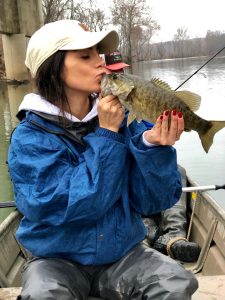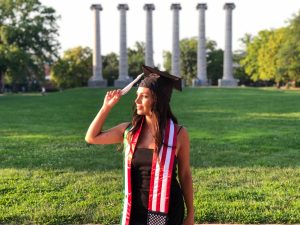Nicole Terherst Amezcua didn’t even tour the University of Missouri before applying to become a Tiger. While studying at the College of the Ozarks, Amezcua felt a desire to pursue a degree at a larger institution, even though it would require a big leap of faith. While Amezcua quickly realized how much bigger MU was, she felt a sense of belonging that she hadn’t felt before.
Amezcua is a Mexican immigrant who grew up near Branson, Mo., around a predominantly white population. Coming to Mizzou was the first time she was in constant contact with individuals who looked just like her.
“It was a lot more than I knew I needed,” Amezcua said. “I had been forcing myself into a mold that wasn’t ever made for me, and I had grown comfortable with that. As I started unraveling all of these things about myself, as you do in college, I learned a lot. Growing up, I was always aware that I was a little bit different than those around me. I was so insecure about my identity. Having such a diverse pool at Mizzou – I’ve felt more comfortable here than anywhere else in my life. I didn’t have to be these things that people wanted me to be.”

Amezcua, a first-generation college student, earned her bachelor’s degree in interdisciplinary studies in May, with components in environmental studies, international studies and business. She is set to begin her master’s degree work in natural resources, with an emphasis in human dimensions, within the MU College of Agriculture, Food and Natural Resources (CAFNR) School of Natural Resources this fall. She will start that work as one of three students who were named George Washington Carver Graduate Fellows, an award that seeks to attract and support under-represented scholars into MS and PhD degree programs in CAFNR. In addition, Amezcua has been awarded the Ronald E. McNair Graduate Fellowship, an award designed to encourage more under-represented students to complete MS and PhD degrees.
“I really didn’t have the words to explain how exciting it was to receive the notification that I was a George Washington Carver Fellow,” Amezcua said. “As I was applying for the award, I learned a lot about imposter syndrome, where someone continually doubts their accomplishments and talents, and how real it is for me. I also realized how much anxiety I’ve had from that syndrome throughout my entire life. With any application, I sent it in with faith, but always expected the worst because I felt like I wasn’t worthy of the honor.
“I don’t know if imposter syndrome will ever end for me. I’ve learned that it is a very real thing, especially among people of color in academia. I obviously did this with a lot of help, but it was my hard work that led to this, which is an incredible feeling. I must be doing something right, and I must be headed in the right direction if others believe enough in me to support me.”
Amezcua grew up with a love for agriculture and was involved in FFA while in high school. She always has had a passion for the outdoors as she was heavily influenced by her father, an outdoor enthusiast. Those interests were in the back of Amezcua’s mind as she began her collegiate career, but she was more focused on a future career that would set her up well financially, something that was enforced by outside voices.
“As an immigrant, the term ‘American Dream’ was all I ever heard,” she said. “My family, my friends and my television repeatedly taught me what it means: doctors are rich, lawyers are powerful, and businessmen travel the world. I sprinted down the path of becoming a global market analyst; a career that would undoubtedly gain me financial security, status and a car more expensive than my mother’s quaint home in Playa del Carmen. For three years, I worked hard and proved that I had what it took to achieve that dream. The only issue was that, as glamorous as it all sounded, it was not actually my dream.”
Between her sophomore and junior year at MU, Amezcua realized she was just going through the motions on her “American Dream” pursuit. It wasn’t fulfilling her in the way she thought it would. She soon learned about the McNair Scholars Program through MU’s TRiO Program, which is designed to help promising students from underrepresented groups meet the academic, financial and social demands of a college education.
Amezcua soon joined the Sustainability Science Lab, led by Damon Hall, assistant professor in the School of Natural Resources, as an undergraduate research assistant through the McNair Scholars Program. She became interested in researching the complexities of how the social world interacts with the environment, especially related to environmental sustainability and water quality.
“During the search to fulfill my ecological curiosities, I came across the McNair Scholars Program,” Amezcua said. “Upon examining my interests in natural resource systems, I was connected with my research mentor, Dr. Hall, who instilled in me that the questions and curiosities I had unknowingly developed throughout my life could be answered by science and research.
“Further, my background in global business, analytical thinking and management, combined with environmental science research, is useful to sustainable business practices and collaborative natural resource management. This aha moment changed my outlook, my ambitions and my path.”
Amezcua’s outlook also changed through two other MU programs – the Women of Color, Honor and Ambition (WOCHA) program and Minorities in Agriculture and Natural Resources Related Sciences (MANRRS).

“Both programs helped me with a lot of things that I internalized, as a minority student and woman of color,” Amezcua said. “I was able to meet so many great people who dealt with the same struggles that I had always pretended I never experienced. Growing up, I would laugh at racist jokes made at my expense because I didn’t want to seem uptight. I was uncomfortable when I had to translate my mother’s Spanish to English in front of others. When I told people that my dad was raised in Arkansas and is white, they seemed to be more accepting of me. I didn’t see anything wrong with those feelings. But in conversations with my mentors and peers in these programs, I’ve learned that those microaggressions aren’t acceptable.
“I’ve had to reshape how I thought, and I how carried myself, and I couldn’t have gone through that change without those I crossed paths with at MU. These programs really made me proud of who I am and helped me become the woman that I am today.”
Amezcua said she is focused on being a role model for Latinas, especially those interested in STEM disciplines. She’s already serving in that role for her 13-year-old sister.
“It’s so important to see faces that look like yours,” she said. “I love seeing how excited my sister is to pursue her own path, and that makes all of this work worth it. I didn’t know what the college process was going to look like, and I went into much of it blindly. Being a resource for her and others is such a rewarding feeling.”
Amezcua added that it has also been rewarding to reflect on her accomplishments so far – but she’s still pushing forward to achieve her goals.
“So many people have played such an important role in getting me here,” she said. “There is a big sense of pride, not necessarily for me, but for my family. I didn’t do any of this alone. Minority students will understand this well, but sometimes all your family can offer you is support. They call me and I’m pulling my second-night, all-nighter in Ellis Library, and they have no idea what I’m studying or what I’m working on, but they’re just so happy that I’m here. So many tears have been shed, but that support makes every long night worth it.
“I’ve had to have hard conversations to get to this point. You can’t change the past, but you can educate yourself and grow. I’m still evolving and I’m still learning. There are still a lot of emotions that I’m dealing with that are packed away deeply. I’m giving myself time to heal and to process those emotions. I’m happy with how far I’ve come and I’ve grown too much to just stop now.”